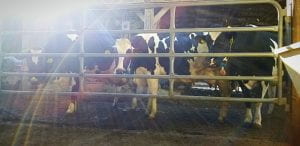On November 2, 2019, our class had its last field trip and to none other than the University’s own research farm. Out of all the field trips, this one was the most informative to me. There is a lot that goes into maintaining a research farm that many people do not understand. Scott Hopkins, the superintendent of the research farm, explained to our class that there are various tasks and responsibilities that are required in maintaining the farm but even so, he loves it. What he loves most, is when he shows people with very little or no knowledge of farming what goes on and seeing the look they have in their eyes; full of awe and amazement. Some of the people, however, that don’t come with some background knowledge can also be a problem. “Always ask before doing anything on another person’s farm!” Scott Hopkins advised. Many times people have done things like touch an animal or pick crops that put either the animal or the human at risk. He explained that some people will just pick some corn and it was part of a research experiment so not only did they mess up the data, but may have also endangered themselves. Even so, Scott Hopkins also enjoys all of the data analysis and research because “I’m kind of science-brained so it’s all pretty exciting to me.” The most exciting research project to him was artificially inseminating a group of queen bees with a single drone. Due to advancements in technology, he is able to experience these great milestones in science and agriculture.


